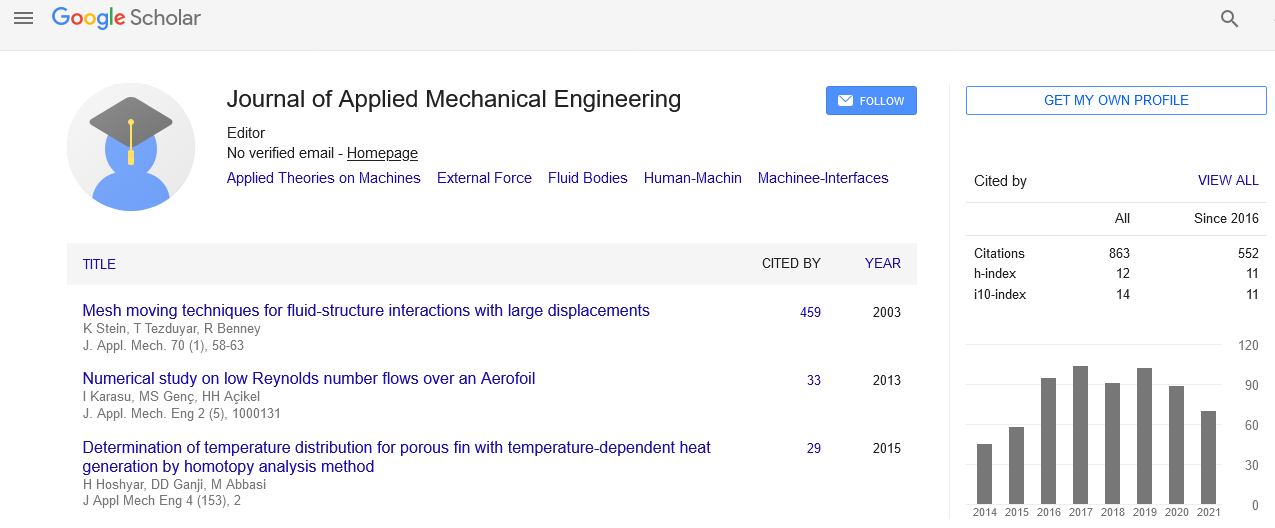Indexed In
- Genamics JournalSeek
- JournalTOCs
- CiteFactor
- RefSeek
- Hamdard University
- EBSCO A-Z
- OCLC- WorldCat
- Publons
- Google Scholar
Useful Links
Share This Page
Journal Flyer

Open Access Journals
- Agri and Aquaculture
- Biochemistry
- Bioinformatics & Systems Biology
- Business & Management
- Chemistry
- Clinical Sciences
- Engineering
- Food & Nutrition
- General Science
- Genetics & Molecular Biology
- Immunology & Microbiology
- Medical Sciences
- Neuroscience & Psychology
- Nursing & Health Care
- Pharmaceutical Sciences
Microstructuring of glass by Spark Assisted Chemical Engraving (SACE)
International Conference on Design and Production Engineering
July 25-26, 2016 Berlin,Germany
L A Hof, C Goyer and R Wüthrich
Concordia University, Canada
Posalux S.A., Switzerland
Scientific Tracks Abstracts: J Appl Mech Eng
Abstract:
Glass is used in industry and academia for fabrication of MEMS devices and microfluidics. This is mainly because of its unique properties, like mechanical strength, thermal properties, transparency, and chemically inertness. However, the hardness and brittleness of glass complicates its micro-fabrication. In particular machining high-aspect ratio structures is still challenging due to long machining times, high machining costs and poor resulting surface quality. Micro-machining methods for glass machining can be divided into three groups: thermal, chemical, and mechanical. Thermal processes like laser are fast and flexible but form usually bulges around the rims of the hole entrances leading to bonding difficulties and often making post process steps necessary. Chemical processes produce smooth surfaces but require expensive masks (low process flexibility) while mechanical methods are relatively slow and result in poor surface roughness. Hybrid technologies like spark assisted chemical engraving (SACE) are advantageous as they endeavor to combine the good outcomes of each process to satisfy most requirements for the desired micro-structures in glass. In SACE technology, an electrochemical process heats a tool-electrode which promotes local etching of the glass substrate. In this paper, we present the state-of-the-art of SACE technology, as implemented in an industrial machine together with Posalux SA. The developed technology allows in particular the machining of deep and high aspect ratio structures in glass, manufacturing crack- and burr-free surfaces. The implementation of a forcesensitive machining head allows the use of ultra-thin machining tools, applying force-feedback algorithms and using the head as profilometer to measure machined features.
Biography :
L A Hof is pursuing his Doctoral research in Mechanical Engineering at Concordia University, Canada, on nanoparticle imprinting on glass substrates by Spark Assisted Chemical Engraving. He obtained his Master’s (with Honours) and Bachelor’s degree in Mechanical Engineering, Advanced Mechatronics, in 2004 from Delft University of Technology, The Netherlands, and did his Master’s research on 3D micro-structuring of glass at École Polytechnique Fédérale de Lausanne, Switzerland. He is winner of several awards including the prestigious doctoral Quebec Merit FQRNT award, was nominated for the Vanier CGS and wrote more than 15 journal and conference papers. His research interests include: micro-/nano systems and advanced manufacturing processes.
Email: lucas.hof@gmail.com

